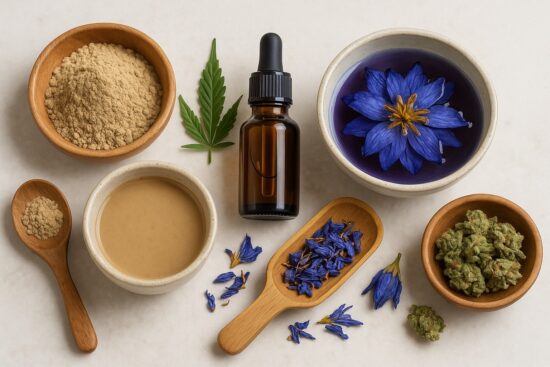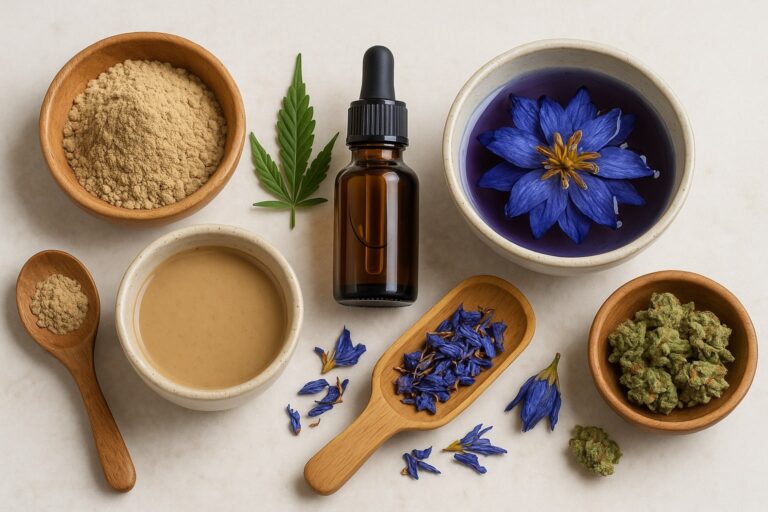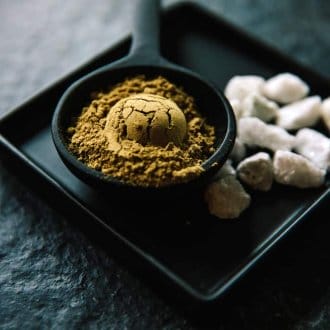Kratom use is changing due to the recent legal changes in Indonesia banning the export of unprocessed Kratom leaves. Some states have pending 2025 Kratom legislation, prompting users to explore herbal alternatives and adjust their routines.
Here at Kats Botanicals, we are always working to help you navigate your Kratom journey. So, if you’re one of those Kratom users looking for Kratom alternatives or substitutes, then this article is for you!
What Is a Kratom Alternative?
A Kratom alternative, or substitute, is a product that isn’t derived from the Mitragyna speciosa plant, but offers similar experiences. Most are plant-based and contain active compounds that may influence energy, relaxation, or clarity. So, if you’re interested in botanical substance use for your wellness, and plant-based, safe alternatives to Kratom, it helps to know what’s out there.
Why Would I Need A Kratom Substitute?
Some of the most common reasons why someone might need to find an alternative to Kratom include:
- New Kratom legislation in your state has implemented a ban on Kratom or its derivatives.
- A favorite Kratom product, like loose-leaf Kratom, is no longer available.
- To take a break from Kratom.
- You are curious about sampling different botanicals for your wellness.
Regardless of the reason, we’re here to help you learn about, and possibly choose, safe and effective Kratom alternatives and substitutes.
Kava: From the South Pacific
Kava is a popular natural kratom substitute for relaxation support that easily matches the efficacy of Kratom. Its use, too, is on the rise in the United States. The Food and Drug Administration has been pretty tough on Kratom use, but doesn’t handle Kava with the same level of scrutiny associated with Kratom. Kratom and Kava are often sold in the United States side by side, or in combined products, as Kava pairs nicely with the effects of Kratom.
Kava is derived from Piper methysticum, a plant deeply rooted in the traditional medicine of South Pacific Islander cultures. It’s often enjoyed for its calming properties, one of the main reasons Kratom is used. The National Center for Complementary and Integrative Health (NIH) notes that Kava has been studied for a variety of uses.
Kava’s primary active compounds are kavalactones, thought to influence feelings of calmness and well-being. Unlike some Kratom strains, such as White Maeng Da, which may be more energizing, Kava is predominantly known for relaxation and social ease.
As a legal Kratom alternative in most states, buying Kava online offers a safe evening option for those looking to unwind.
⭐⭐⭐⭐⭐ “I love Kat’s Kava Gummies. They’re a perfect calm and mellow experience at the end of the day and the gummies taste good!” – Jennifer K.
Kanna: A South African Succulent
Some users compare Kanna vs Kratom due to their similar pharmacology and potential for enhancing effects. Kanna, Sceletium tortuosum, is another plant to consider when looking for herbal products like Kratom.
The Kanna succulent is native to South Africa, where pastoralists and hunter-gatherers traditionally used it. They valued Kanna for its calming and centering effects.
You may remember that Kratom has alkaloids like mitragynine and 7-hydroxymitragynine. Kanna also has active alkaloids, mainly mesembrine, though they work differently from Kratom, more similar to serotonin reuptake inhibitors. Users report that taking Kanna makes them feel calm and focused. Some also find it mildly stimulating in lower doses, while higher amounts may be more sedative.
Akuamma Seeds: An African Traditional Remedy
Akuamma, Picralima nitida, seeds originate from a tree native to West Africa that produces effects compared to Kratom. The primary active compound in akuamma, akuammine, is structurally similar to mitragynine, one of Kratom’s main alkaloids.
It is thought that akuamma may interact with certain receptors and offer potential for general physical ease. Some users also report relaxing effects, positioning it as a Kratom replacement option, possibly akin to Red Vein Kratom.
However, akuamma seeds are infamous for their intensely bitter taste, which can be a significant deterrent for some individuals. They are often ground and placed into capsules to bypass this issue.
- Scientific research on akuamma effects is a bit limited.
- Anecdotal reporting is key. You can learn a lot from Reddit.
- Effects may vary.
- Always check sourcing and for possible regulations where you live.
Blue Lotus: The Dreamy Water Lily
Blue Lotus (Nymphaea caerulea) is a water lily native to Egypt, with a rich history of reverence in ancient Egyptian culture. Its traditional medical use was notably due to calming and potentially psychoactive properties.
People often consume Blue Lotus as a tea or infused in wine, to lift their spirits and help them relax. Blue Lotus may be a good alternative for those seeking a hassle-free botanical support that’s easily accessible for purchase.
The active compounds in Blue Lotus are thought to be apomorphine (a dopamine agonist) and nuciferine. Users make Blue Lotus tea, sipping for reported “calm and dreamy” effects.
Compared to Kratom, Blue Lotus generally exhibits much milder effects. Quality can vary significantly, as can the effects of this herb. Be sure when you buy Blue Lotus online, you’re ordering the real thing.
CBD: Cannabidiol
CBD, or cannabidiol, has gained enormous popularity in recent years as a daily supplement, sometimes partnered with the effects of Kratom. It is one of over a hundred cannabinoids present in the cannabis plant. Unlike THC, CBD is not psychoactive and will not induce a “high,” making it a sought-after compound for wellness. Many people turn to CBD oil or other CBD products as a natural alternative for various goals, some of which overlap with reasons individuals use Kratom.
CBD interacts with the body’s endocannabinoid system, which helps regulate discomfort, stress cycles, and more. While research is still emerging, many users report feeling calmer and more balanced with regular use. Since CBD isn’t considered addictive, many people appreciate the harm reduction with no worries over dependence, withdrawal symptoms, or overdose.
Available as oils, tinctures, edibles, capsules, and topicals, CBD’s effects vary by form and dosage. Unlike Kratom, its effects are often more subtle and gradual rather than immediate.
CBD is widely legal and accessible (though state laws may differ) and is generally considered safe. Still, it’s important to choose high-quality products with third-party lab testing.
New to CBD? Check out our guide to “An Introduction to CBD.”
⭐⭐⭐⭐⭐“Strongest CBD you can get at a very reasonable price. Once again Kat’s hits it out of the ballpark!” – Sandra S.
Choosing the Right Alternative Based on Your Needs
Exploring Kratom alternatives can open up many possibilities for supporting your energy, relaxation, or general wellness goals. Whether you’re considering Kava’s calming effects, a peaceful Blue Lotus tea, or the broader wellness benefits of CBD oil, many paths are available.
The table below provides a quick look at the different products and their reported effects:
| Alternative | Primary Reported Use | Often Compared To |
|---|---|---|
| Kava (Kava Kava) | Support for: relaxation, calm, social ease | Red Vein Kratom |
| Kanna (Sceletium tortuosum) | Support for: calm, motivation, balance | Green/White Vein Kratom |
| Akuamma Seeds (Picralima nitida) | Support for: discomfort, relief, relaxation | Red Vein Kratom |
| Blue Lotus (Nymphaea caerulea) | Support for: mild relaxation support, social ease | Milder than most Kratom |
| CBD (Cannabidiol) | Support for: calm, ease, daily balance | Red/Green Kratom |
Top Legal Kratom Alternatives
The legal status of Kratom and the more well-known alternatives we’ve discussed so far vary by state and country. The ones listed below are currently legal in all fifty states of the US.
Some of these are close relatives of Kratom, while others offer different pathways to achieve similar wellness goals. Remember, individual responses may vary, and understanding the active compounds can be helpful.
- Mitragyna hirsuta and Mitragyna javanica are botanical cousins to Kratom, though generally milder in effects. Hirsuta is often reported to be relaxing, while Javanica may be a little stimulating for some people.
- Sakae Naa, Combretum quadrangulare, is another plant from Southeast Asia. Some people report a lift for the body and mind, sometimes compared to White Vein Kratom.
- Muira Puama, Ptychopetalum olacoides, is a plant native to the Amazon rainforest and has a place in Brazilian traditional medicine. It is often referred to as “potency wood” and has been used traditionally as a general booster.
- Ashwagandha and Rhodiola rosea are adaptogenic herbs, and are used for calm or energy support, reportedly by helping you adapt better to stressors.
- When combined, turmeric and black pepper have been reported to help people feel more comfortable. Curcumin, the active compound in turmeric, has been long-studied for its potential as an anti-inflammatory agent. Black pepper contains piperine, which may boost curcumin’s bioabsorption. Read more about turmeric powder and Kratom.
Kratom Alternatives FAQs
Generally, yes, although it’s a good idea to double-check for specific products, such as CBD.
Some Kratom suppliers also provide Kratom alternatives, like these botanicals online, but make sure you get quality products to avoid bad experiences.
Several natural botanicals may offer effects similar to Kratom, including Kava, Blue Lotus, Akuamma, and CBD. While these botanicals don’t work exactly like Kratom, many users find they support similar wellness goals, though with variable, often milder, effects. As with Kratom, only purchase from trusted, lab-tested sources. Start low and increase slowly with dosing.
Some of the most popular names in the world of Kratom alternatives include:
- Kava
- Akuamma
- Kanna
- Blue Lotus
- CBD
These botanicals each offer their unique benefits. If you’re exploring Kratom substitutes, look for full-spectrum, high-quality products – and be sure to check the legal status in your area.
Botanicals like Kava, Akuamma, and Kanna are often used as natural alternatives to Kratom. While they don’t deliver the exact same effects, many people turn to them for calm, support, and other goals. Each plant works differently, so finding the right fit may take some experimentation. Start with small servings, listen to your body, and choose reputable sources like Kat’s Botanicals for peace of mind and product integrity!
Remember, finding the best Kratom product substitutes involves personal experimentation and careful research. Your journey might involve trying different forms, similar to choosing between Kratom powder and loose leaf Kratom. Wherever you are on your wellness journey, Kat’s Botanicals’ Kratom alternatives can help you explore additional paths to botanical wellness.










